Children's Russian winter athletics. Maria Kuchina (CSKA): the Russian Winter tournament is always a colorful holiday! Lysenko still received half a million
On Sunday, February 5, the XXVI athletics competition “Russian Winter” 2017 will be held in the CSKA athletics arena. On the eve of the tournament in Moscow, the ITAR-TASS agency held a press conference dedicated to the upcoming sports festival.
“Russian Winter” will be held for the 26th time. This year the competition was included in the Winter Athletics Tour of the All-Russian Athletics Federation. This time more than 200 athletes will take part in the tournament.
The press conference was attended by the President of the All-Russian Athletics Federation Dmitry Shlyakhtin, the head coach of the Russian national teams Yuri Borzakovsky, the competition director Alexander Cherkashin and the current world champion in the high jump - CSKA athlete Lieutenant Maria Kuchina.
The Russian Winter tournament is always a colorful holiday when the arena is crowded with spectators. I hope that this time the tournament will be just as bright. We aim to show good results at the tournament and demonstrate to the whole world that Russian track and field athletes work hard and do not give up, no matter what,” Lieutenant Kuchina told reporters.
The tournament has a prize fund. According to the head - senior coach of the CSKA athletics team Andrey Kruporushnikov, 500 thousand rubles. will be received by an athlete who fulfills two conditions at the Russian Winter: 1) His result must be the best in the world in the winter season on February 5, 2007; 2) His result must be the best of all the results shown in all disciplines of the “Russian Winter” 2017 according to the IAAF table (table of results of A. and B. Spiriev). Also 300 thousand rubles. will be received by athletes who showed 2, 3 and 4 results at the Russian Winter according to this table.
During the tournament, the Russian Anti-Doping Agency (RUSADA) will hold a number of seminars.
"RUSSIAN WINTER" - 2017. SCHEDULE:
16.30 - Opening ceremony of the competition.
16.50 - High jump. Women. The final
17.00 - Pole vault. Women. The final
17.02 - Long jump. Women. The final
17.03 - 1500 m. Women. The final
17.10 - 60 m with barriers. Women. Race 1
17.11 - Shot put. Men. The final
17.15 - 60 m with barriers. Women. Race 2
17.25 - 60 m with barriers. Men. Race 1
17.30 - 60 m with barriers. Men. Race 2
17.33 - 3000 m. Men. The final
17.47 - 60 m. Men. Race 1
17.51 - 60 m. Men. Race 2
17.55 - 60 m. Women. Race 1
17.58 - Triple jump. Men. The final
17.59 - 60 m. Women. Race 2
18.10 - High jump. Men. The final
18.14 - 60 m with barriers. Women. The final
18.24 - 60 m with barriers. Men. The final
18.30 - 400 m. Men. Final B.
18.35 - 400 m. Men. Final A
18.40 - 400 m. Women. Final B
18.45 - 400 m. Women. Final A
18.50 - 60 m. Women. The final
18.55 - 60 m. Men. The final
19.00 - 800 m. Men. The final
19.10 - Award ceremony for all winners
The competition will take place at the CSKA Physical Fitness Center (Moscow, Leningradsky Prospekt, building 1).
On Sunday, the 26th traditional “Russian Winter” tournament took place in the CSKA arena, where the 19-year-old Russian record holder among juniors set a personal record and the second best result of the season in the world in the high jump - 2.33 m.
Natalya MARYANCHIK
from Moscow
THE QUEEN BECAME A MAID
In the conditions of isolation, in which Russian athletics has been in its second year, “Russian Winter” has turned into the central event of the season. A tournament of the strongest and a social event at the same time, the only opportunity for professionals and fans to look each other in the eye, and for athletes to test their strength in conditions of at least some competition.
“Russian Winter” has probably never assembled such a strong line-up - if we do not take into account the absence of foreign participants - in history. All the Russians who compete this winter came here: she flew in from the American training camp, and the pole vaulter came from Italy. It’s even sadder that, despite the impressive lineup, there were empty seats in the stands.
Athletics in our country is turning into a behind-the-scenes sport. It seemed that the cheerful mascot of the tournament named Ruzi was jumping along the path, as before, and the participants tried their best. But the scale and solemnity of the whole event was clearly lacking. It’s as if our “queen of sports” has somehow become a modest servant.
KLISHINA: I AM FORCED TO PERFORM UNDER A NEUTRAL FLAG
The looks of most spectators were predictably drawn to long jumper Daria Klishina. Since the Rio Olympics, Klishina remains the only Russian athlete (not counting) who has permission from the international federation to compete outside the country. Hence the attitude towards “Russian Winter” - simply as a passing start, and not the last battle, as for other rivals.
Actually, little has changed in Klishina’s jumping since Rio. All the same calm, measured movements, beautiful from the first to the last step. And the same result - 6.64 m in winter in Moscow, 6.63 m in summer in Rio. The only difference is that at the Games, surrounded by the entire world elite, Klishina was ninth, and at the “Russian Winter” she was first.
This is a special tournament for me, where I actually started my career,” said Klishina. - When I was just a little girl, I was put here as the ninth participant, out of competition. This is my home arena, and I have been playing for CSKA for 13 years. I'm glad that I was able to bear this responsibility.

Daria KLISHINA. Photo by Alexey IVANOV, "SE"
- How do you feel about the fact that you will compete without a flag at the next European Championship?
Unfortunately, I was placed in such a framework that I am forced to perform under a neutral flag. This would be unpleasant for any Russian athlete, and I am no exception. But I think when I enter the arena, everyone will know that in fact, I represent Russia. And it doesn’t matter under what flag, I still fight for my country. Well, I really hope that the other guys will still receive an answer from the international federation and that I will not be alone in Belgrade.
- You were already the only Russian woman in athletics at the Rio Olympics. What did that experience give you?
First of all, I realized that there is nothing scary about the Olympics. These are ordinary competitions that should be enjoyed one hundred percent. Unfortunately, due to certain circumstances, I was unable to do this. But still, I think anyone would give anything to be there. Although I won’t lie, it was very difficult for me in the summer. Since then, I have tried not to read the press at all to save my nerves.
- Have you ever wondered if you suddenly win the European Championship, what will happen to the anthem and the flag?
I have already been asked which anthem should be played. But this is such an extraordinary situation that I don’t even know. Even at the Olympics, I still competed under the Russian flag. For now, I don’t want to think about this neutrality at all. What if a miracle happens and this decision is changed?

Danil LYSENKO. Photo by Alexey IVANOV, "SE"
LYSENKO STILL RECEIVED HALF A MILLION
The organizers skillfully saved the men's high jump tournament for the curtain of the competition. If you believe that the latter is best remembered, then this “Russian Winter” will remain in history as an undoubted success. In fact, this was the only event where the fight for victory was at the level of the best result of the season in the world.
The Olympic champion, who already had a jump of 2.35 this winter, skipped heights one after another in his style. As a result, Ukhov reached 2.36 in just four attempts. The surprise here was that Ukhov’s competition was the 19-year-old world junior champion Danil Lysenko. Moreover, he diligently jumped everything, including a personal best of 2.33 - on the first try.
Tactical games this time did not bring success to Ukhov. Both failed at 2.36, but since the Olympic champion for some reason missed 2.33, Lysenko became the winner of the competition. Moreover, if not for Ukhov, Danil would have received a prize for the best result of the season in the world - and this is 500 thousand rubles minus taxes, a lot of money by the standards of modern Russian athletics.
But the Olympic champion fell by 2.35 on December 29 in Yekaterinburg. And then he himself did not receive any prize money, and Lysenko unknowingly crossed the road. Although it turned out that according to the regulations on competitions, the beginning of the winter season in our country is considered to be January 1, 2017 - contrary to the principles of the IAAF and generally common sense. So Ukhov’s jump on December 29 sank into oblivion, and Lysenko received his honestly earned half a million in prize money.

Ivan UKHOV. Photo by Alexey IVANOV, "SE"
Russian Winter.
Men. 60 m. 1. Lopin - 6.69. 60 m s/b. 1. Shabanov - 7.77. 400 m. 1. Savin - 47.24. 800 m. 1. Kholmogorov - 1.48.47. 3000 m. 1. Nikitin - 7.44.65. Length. 1. Primak - 7.94. Triple. 1. Yurchenko - 16.94. Height. 1. Lysenko - 2.33. Pole. 1. Kotov - 5.63. Core. Afonin - 20.82.
Women. 60 m. 1. Sivkova - 7.32. 60 m s/b. 1. Nikolaev - 8.20. 400 m. 1. Renjina - 52.52. 1500 m. 1. Gulyaeva - 4.07.47. Length. 1. Klishina - 6.64. Triple. 1. Krylova - 13.89. Height. 1. Cucina - 1.91. Pole. 1. Sidorova - 4.70. Core. 1. Zyryanova - 17.65
The traditional athletics tournament, held for the 26th time in the capital's CSKA gymnasium, showed that the patient, that is, Russian athletics, is more likely alive than dead.
“Disgrace” by Kuchina...
Remember from Vysotsky: “Oh, Vanya, Vanya, you and I are needed in Paris like pliers in a bathhouse!” These lines involuntarily came to mind when, before the start of the traditional “Russian Winter” tournament, your humble servant from the hall of the capital’s CSKA gymnasium went down, excuse me, to the toilet. Instantly, a feeling of a mini-apocalypse arose: pitch darkness, which was broken only by the glowing gadgets of visitors who did not want to cause “devastation in the closets,” and terrible heat, as if a heating pipe had burst somewhere nearby. In short, a steam room in which, by the way, there will be both pliers and skis, to continue quoting Vladimir Semenovich.
Today's Russian athletics are just as needed in Paris, as well as in other European and overseas capitals and villages, as is the song Vanya. That is why the traditional “Russian Winter” tournament, which just a few years ago brought together full stands of the army sports complex on Leningradsky Prospekt and individual stars of the first magnitude among visiting foreign athletes, this time evoked another sad analogy. This is what happens in the home of a seriously ill person, when the relatives are outwardly cheerful and put smiles on their faces, but inside everyone is saying prayers for health, while at the same time preparing for the worst.
However, in conditions of complete sports isolation from the outside athletics world, the current “Russian Winter” was marked by the presence of several sonorous domestic names.
The line-up of participants in the women's and men's high jump was especially impressive. Olympic champion Ivan Ukhov, who intended to skip the winter season, eventually lost to 19-year-old talent Danil Lysenko, who set a personal best (2.33), and Maria Kuchina predictably took the lead in the ladies' match. For first place, it was enough for her to achieve a modest height (1.91). Already in the rank of winner, Maria stormed the bar at the mark of personal achievement (2.01), but she did not submit to it. Although the 24-year-old Russian woman was very close to success.
Coming out to the journalists in the mixed zone, Masha immediately began to “light up”:
With what result did I win? 1.91? Disgrace! Of course, I understand that I’m ready for more, but the fact is that for good results I need emotions and strong rivals. It takes that day, that mood, that luck for everything to come together, and it gives a result. Of course, we continue to hope that our individual applications will be considered and we will receive admission to the European Indoor Championships in March. Therefore, we are organizing our preparations in such a way as to reach peak form by the beginning of March.
- What do these individual applications generally look like and what information must be included in them?
They are not presented in free form, but according to a certain pattern. Data is entered there, from what year the athlete has been involved in athletics at a professional level, in which competitions he took part before and how many times and when he underwent the doping control procedure. In general, everything that can help you gain access to international competitions.
- Have you already been tested for doping this year?
Yes, I am on the list of athletes who are controlled by the ADAMS system, so I can be subject to verification at any time. In January, doping officers already came to me for competitions in Volgograd.
After submitting individual applications, do you feel supported or, on the contrary, do you encounter negativity from fans calling you “traitors” and “unpatriots”?
I definitely feel more support because those with whom I communicate understand what sports means to me and my family. Of course, there are some attacks against me, but I try not to read them on the Internet - otherwise it can destroy any psyche. I read it once and decided: that’s it, stop! And now I only communicate with those people who can charge me with positivity.
Answering a question about her immediate plans, Maria announced her participation in the tournament in St. Petersburg, which will be held on February 14, and a week later in the Russian Winter Championship.
...And Klishina’s “special position”
The main star of the current “Russian Winter” was Daria Klishina, the only Russian representative at last year’s Olympics in Rio. The long jumper, who celebrated her 26th birthday in mid-January, has been living and training in America for several years, thanks to which she has not been subject to anti-Russian sanctions, but, apparently, she has no intention of becoming a cut-off piece for her homeland. To win this year's Russian Winter, Daria only needed a jump of 6.64 in her first attempt.
“I’m not happy with the result at all,” Klishina critically assessed her performance. - I jumped much further in training, but this was my first start indoors. Nevertheless, I expected to jump here by at least 6.80. I trained outdoors, where a strong wind was constantly blowing, so it was difficult to adapt to completely different conditions. In the arena, by the way, the run-up is somewhat different.
How does this whole situation with the hostile attitude of the world sports community towards Russian athletes affect you?
Of course, it is very difficult for boys and girls to find the motivation to regularly conduct full-fledged training - after all, so far none of the Russian athletes have received a positive response to their individual applications. In this regard, it is much easier for me, because I have the opportunity to perform on the international stage. But in any case, I really hope that in the end all this will be resolved in our favor, and I won’t have to compete alone at the European Championships again.
- What is your attitude towards performing under a neutral flag?
Unfortunately, we have been put in such conditions that now we cannot compete under the Russian flag. Of course, this is not pleasant for any of us, but I know that everyone who takes the start line at the upcoming European Championship will fully represent Russia. All the same, we remain Russians and fight for our country. For me personally, the main thing is that my family, friends and relatives do not consider me a traitor, and the opinions of other people do not really bother me. After last summer, when I experienced a lot of stress, I try to read the press and news on the Internet as little as possible, I prefer to be away from all these events.
...And the light in the toilet of the CSKA gymnasium did appear at the end of the competition day. Let's consider this a good sign - a light at the end of the tunnel for long-suffering Russian athletics.

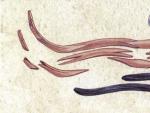
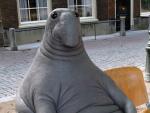
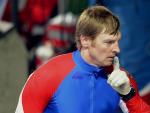
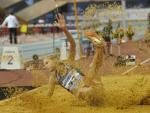

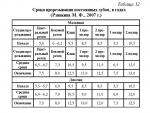
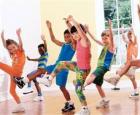 Physical education lesson in the senior group
Physical education lesson in the senior group Hellride Educational: MTB Frame Dropouts
Hellride Educational: MTB Frame Dropouts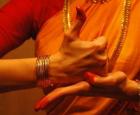 Mudra of wealth “Sea Scallop”!
Mudra of wealth “Sea Scallop”!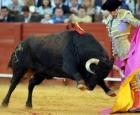 Spanish bullfighting and bullfighting shows in other countries
Spanish bullfighting and bullfighting shows in other countries